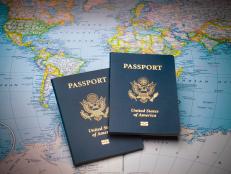How Not to Be a Jerk When You Travel the World
Travel Channel experts offer their tips for minding your manners when traveling locally or abroad.
Related To:

Photo By: White Pass & Yukon Route
Photo By: GettyImages/Sandy Huffakerr
Photo By: GettyImages/LILLIAN SUWANRUMPHA
Photo By: VazgenLA
Photo By: GettyImages/Bloomberg
Photo By: Shutterstock/Jakub Zajic
Photo By: Curtis Akin / NPS
Photo By: GettyImages/MANAN VATSYAYANA
Photo By: GettyImages/Media for Medical
Photo By: Photos courtesy The Beekman Hotel
Photo By: paolo gualdi
Photo By: Courtesy Provast
Photo By: Visit Ireland
Photo By: Reuters
Mind Your Manners
A critical part of travel is etiquette, and adjusting to the places you are going and modifying your behavior accordingly. Showing respect and humility when you are in a new environment is important, as is realizing you are an ambassador for America when you travel abroad and people will form opinions about your country from your behavior. And because travel often entails being in cramped buses, airplanes and trains with strangers, it is important to be on your best behavior to ensure that not just your—but everyone's—journey is pleasant. We polled Travel Channel editors, writers and frequent travelers for their tips on how to make the best impression when you are traveling abroad, which often includes knowing what not to do.
See More Photos: 20 Etiquette Mistakes You Don't Want to Make When You Travel
Don't Be That Guy
Want to be a conscientious traveler? Wait your turn for deplaning. Jumping up to grab your bag when the plane finally hits the gate doesn’t help anyone if you’re in row 22. Enjoy the few final minutes of sitting before rushing to your next gate or baggage claim and don’t cut the person who is sitting ahead of you to get off the plane first.—Jordan Lawson
Do Your Research
My husband and I did a lot of research on cultural customs before our honeymoon trip to Thailand to ensure we were respectful visitors. For us, the most crucial information we learned and utilized was: learning the wai [Editor's note: the wai is a traditional Thai greeting accompanied by a slight bow and palms pressed together as if praying]; removing our shoes before entering homes, some stores and religious sites; and covering up when visiting temples and shrines (no sleeveless tops, shorts or flip-flops). And while Thai isn’t a language you can binge as a novice before a trip, learning "Sawasdee krab/ka" (hello/goodbye) with the wai is crucial to pen to memory. You’ll say it dozens of times a day to everyone you encounter.—Kayla Kitts
Pictured: Danish Leicester City soccer player Kasper Schmeichel shows proper travel etiquette in Thailand, greeting the press with a traditional Thai wai gesture.
Don't Ignore Personal Space
My husband and I paid for "extra space" seats on a 14-hour flight to Dubai last fall, hoping that those added inches might make it easier to sleep. As most of the cabin curled up for shut-eye, two businessmen made a show of "waiting for the bathroom" and parked themselves in our leg room, which (despite our protestations) became their pop-up bar. Friends: The first rule of in-flight WCs is that you do your business, as it were, and return to your seat. A plane is no place for a hostile takeover.—Lauren Oster
Ask Permission Before You Snap
If you'd like to photograph someone you don't know, you need to ask for their permission – and if they seem uncomfortable with or incapable of giving it, you don't have it. People are not street art, full stop. —Lauren Oster
Airplane Meal Etiquette
Always, always, always: Put your seat up during meal times on flights. We're squished into these seats enough as it is and it's just common courtesy to let your seat up to create more space for dining. It can also be dangerous if you don't. A man in front of me once reclined so quickly that it spilled hot coffee all over me. Not only was it searing hot and painful but then I had to sit in stained wet clothes for the rest of the flight. Not cool. As a general rule, recline slowly and take a glance back when you do.—Deanne Revel
Check Your Entitlement
I live in a city in Mexico where a lot of American and Canadian retired expats also live. At dinner last week, I overheard a woman at a table next to us ask the waitress if she could have a foot rest brought to her since she had hurt her toe at golf the day before. I thought I had heard it all, but nope...at an Asian-fusion restaurant in Mexico it's now apparently cool to ask for foot rests. This woman was none too happy when the waitress calmly explained that they don't have any foot rests available for guests. I know that we all sometimes have unexpected needs when we travel, but it seems like the best game plan would have been to bring along whatever she needed at dinner to make herself the most comfortable rather than expecting the restaurant to figure it out.—Erica Reitman
See More Photos: Dining in China: Essential Etiquette and Customs to Know
Keep Your Dang Shoes On!
My tip is simple and to-the-point: Keep your DANG SHOES ON. Don’t be this person.—Mallory Ziglar
More Foot No-Nos
Sometimes tourists want to soak their tired feet—but don’t do that in the hot springs in Yellowstone National Park. I once saw a man dipping his feet in and out of the bubbling water in a hot pool, which is expressly forbidden in most areas. It’s also incredibly dangerous. Be a conscientious traveler and protect our parks—and yourself.—Lynn Coulter
Manage Your Dietary Restrictions Yourself
Part of a traveler’s "job" as a gracious guest/visitor is knowing how to take care of themselves on a basic level - if you know you need, say, meatless, gluten-free, or other options, equip yourself with the information to find and ask for them respectfully.—Lauren Oster
Break Those Bills
In most developing countries, Americans have a reputation for being wealthy travelers. An ATM withdrawal of a few hundred dollars could net you an incredibly large amount of spending money in a country like Vietnam, Romania or Costa Rica.
Even as a decidedly middle class American millennial, I've often made the simple mistake of overlooking my newfound wealth overseas, and that has led to some awkward encounters with local cab drivers, merchants and street food vendors. Can you imagine asking someone to provide change for a bill that's worth more than they make in a day? It's not a great feeling for either party.
Thankfully, the solution is simple. Hotels are often able to break larger bills for you, as are banks and some restaurants. If you're in a country with a favorable exchange rate, make it a point to swing by one of these businesses and break up a few of your larger bills. You'll make life easier on the locals and yourself by doing so.—Joe Sills
Use Your Inside Voice
In restaurants, on the street, at concerts and in hotel lobbies, keep it down. Americans can often speak in authoritative, booming voices and it's just not a good look in a foreign country to make your presence known in such a loud and aggressive way.—Felicia Feaster
Be Hotel Savvy
Be quiet when walking through hotel corridors. Many hotels – especially older buildings -- have paper-thin walls and doors, so you can hear everything that is happening in the hallway and adjacent rooms. Some people might have a super early flight or they just got their kids to sleep. Don’t be an inconsiderate blockhead and yell to your friends down the hallway, loudly sing a song from that concert you just saw or let the door slam behind you.—Jackie McGilvray
How to Avoid Being a Bad Houseguest
Practice Good Street Manners
One thing I would encourage people to do is not to scroll and stroll in airports or down city streets. It’s easy to get lost in your device and be unaware of your slow pace and meandering path. If you need to do more than glance at your screen, please pull over and let others pass.
On busy city streets, try to avoid walking parallel if your group is greater than two. Single file is best so that busy locals can pass easily. For families, adults can walk in front of and behind children. This is also a great way to watch for and prevent pickpocketing.—Steve Larese
Brush Up on Your History
Research the history of the nations you're visiting. It's amazing how many countries are still impacted by wars that happened many decades ago, even the Napoleonic wars . Apart from learning basic world history, it explains the culture of today. In a recent trip to Rotterdam, I marveled at the modern architecture. Someone asked where all of the historic buildings were, and our host choked up. The city was completely destroyed during World War II, and this loss is still felt today.—Steve Larese
Adjust Your Expectations
Don't be offended if your friendliness isn't reciprocated in the way you think it should be. If a smile or casual greeting isn't returned to your liking or if people seem reserved, it doesn't mean the person is being rude. Learn from encounters to better learn local customs and interactions, and watch how locals interact with one another in shops, etc.—Steve Larese
Respect People's Work Obligations
You're on vacation, but servers are working and trying to help many customers. Read the situation before being too chatty or asking a lot of tourist advice. People are glad to help, but café waitstaff aren't tourism bureaus. That said, oftentimes waitstaff will be more than happy to strike up casual conversations and make suggestions, even in non-tipping societies.—Steve Larese
Bathroom Etiquette Around the World: What You Need to Know








